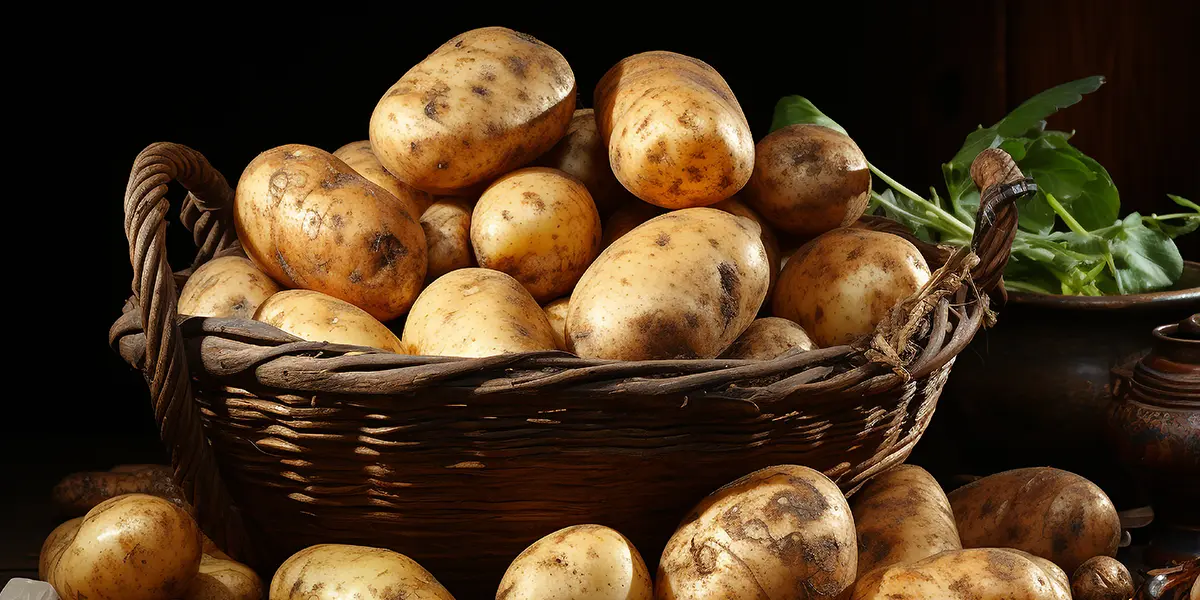Is Eating Potato Good For Weight Loss?

We all love it – it goes well with almost any Indian sabji or side dish, helps when extra guests show up and comes to the rescue when there’s “nothing to cook.” Yes, we’re talking about the potato!
Commonly known as aloo or batata, the potato is a staple in most Indian households. This humble root vegetable grows underground and has a mild, starchy taste with a soft texture when cooked. Its versatility is what makes it a favourite – it can be boiled, fried, mashed, or roasted, fitting effortlessly into countless dishes.
From jeera aloo and aloo methi to dum aloo, masala dosa and batata vada – potatoes are a part of so many of our dishes. They come in different varieties, too, like brown-skinned and pink-skinned, each adding its own touch to our everyday meals.
Is your weight increasing your health riskHealthy Weight
Calculator
Funny how something that didn’t even come from India feels like it’s always been a part of our kitchens!
| Did you know?
Potatoes were first grown in the Andes mountains of South America over 7,000 years ago! They travelled across the world and were introduced to India by the Portuguese in the 17th century! |
What is the Nutritional Value of Potato?
| Nutrient | Nutritional Value (Per 100 g) | |
| Brown Skin | Red Skin | |
| Energy | 70 kcal | 73 kcal |
| Carbohydrate | 15 gm | 15 gm |
| Protein | 2 gm | 2 gm |
| Calcium | 10 mg | 9 mg |
| Phosphorus (P) | 43 mg | 30 mg |
| Total Fiber | 2 gm | 2 gm |
| Potassium | 541 mg | 501 mg |
| Total Starch | 12 gm | 13 gm |
Are You Eating Potato the Wrong Way?
We often think of potatoes as a vegetable, but here is the thing – it’s not. If you look at the nutrition facts in the above image, potatoes have just 2 grams of fiber, meaning they don’t really count as a fibre-rich veggie. Instead, they’re mostly starch, just like rice and roti or any other form of starch.
This matters because how we eat potatoes in our meals makes a big difference.
What Are We Doing Wrong?
1️⃣ Thinking potatoes are a vegetable – No, they aren’t! Eating aloo sabzi is not eating ‘sabzi’. You’re not getting the fibre you’d get from actual veggies & green leafies like bhindi, spinach, gourds, capsicum etc.
2️⃣ Eating it in unhealthy ways – like in fries, bhajiyas, bondas, pakoras, chips etc.
3️⃣ Eating it with rice or roti – This is how we usually eat potatoes, right? But this is actually eating carbs on carbs, making your meal mostly starch-laden and less balanced. How?
How Starchy Is Your Meal?
|
Food with standard serving |
Carbs in it |
| 1 medium-sized cooked potato about 100 grams | ~25-28 grams |
| 1 medium-sized wheat roti made with about 40 grams of atta | ~30 grams |
| 1 bowl (about 100 grams) of cooked white rice – made with 30-40 grams of raw rice | ~30 grams |
This grid tells us that the carb in each of these 3 items above is very similar. That’s why we said earlier that having aloo sabji/curry with rice or roti means having carbs and more carbs.
So, How to Eat Potatoes Smartly?
No one’s telling you to quit potatoes – we all love them! Just eat them in a way that works better for your body, especially if you’re trying to lose weight or following a potato diet. 😊
- Don’t have it with only rice/bread or only roti – Avoid a meal which has only rice or only roti/ chappati/puri, and the accompaniment is just an aloo-based sabji. That’s a carbs overdose for you.
- Add more protein – If the potato is unavoidable, then take very little of it. More importantly make sure to load your plate with more protein sources like chicken, eggs, fish, paneer or lentils (like dal) and other veggies, too.
- Balance it out – Use more gobhi than aloo in aloo gobhi, more matar than aloo in aloo matar and any dish where aloo is the ‘main’ item.
- Cook wisely – Choose boiled, baked, or air-fried potatoes instead of fried versions.
- Skip unnecessary calories – Avoid adding things like butter, cheese, or heavy creams or don’t make your sabji in too much oil.
- Don’t remove the skin – The skin contains valuable fiber and nutrients that support digestion. Don’t peel them away.
- Eat Whole, Fresh Potatoes – Avoid processed potato products like chips, puffs, fries, samosa, batta vada, aloo sandwich, aloo pakoda, aloo puff that contain unhealthy additives and excess sodium.
- Stay Active – Your daily activity level should match your calorie intake. Sedentary lifestyles require smaller portions, while active individuals can consume slightly more.
Is It OK to Have Potatoes During Fasts?
Yes, but definitely in moderation – especially if weight loss is your goal. Potatoes are high in carbs. Carbs give us energy – and because during fasting, we feel low in energy, they’re eaten.
But do remember that they are high in starch content and can cause blood sugar spikes and you can feel hunger sooner.
To make them fasting-friendly:
✔ Limit portions to avoid excess calories.
✔ Choose boiled or roasted over-fried versions.
✔ Pair potatoes with protein & fiber (paneer, curd, nuts).
Since there is a limited choice of foods during fasting, potatoes can be eaten, but eating them mindfully prevents energy crashes and overeating later.
What are the Potential Benefits of the Potato Diet?
- Potatoes are low in fat and contain important nutrients like vitamin C, potassium, and fiber (when eaten with the skin).
- They are naturally gluten-free, making them a suitable option for people with gluten intolerance.
- Due to their high satiety factor – as compared to rice/roti/bread, potatoes can help keep you full for longer and reduce overeating.
- They provide quick energy and are easy to digest, making them a good option for active individuals and children.
Potential Risks or Downsides to the Potato Diet?
- Potatoes have a high glycemic index, which can cause spikes in blood sugar levels which can ultimately cause weight gain.
- If consumed in excess or in fried forms (like pakoda, vada, samosa, patties, chips or fries), they can contribute to weight gain and increase the risk of metabolic issues like diabetes.
- Over-reliance on potatoes may lead to nutrient deficiencies due to a lack of other nutrients in the diet.
When Should You Avoid Consuming Potatoes?
- If you have diabetes or insulin resistance, monitor your potato intake as it can affect blood sugar levels.
- If you are trying to lose weight, avoid fried and calorie-dense potato preparations.
- People with certain digestive issues may need to limit potatoes, especially if they experience bloating or discomfort after eating them.
- If you are on a strict low-carb or keto diet
- If You have digestive issues like bloating or discomfort after consuming potatoes, especially when eaten in large amounts.
How We at Fitterfly Can Help You?
At Fitterfly, we believe in smart eating, not strict dieting. Potatoes aren’t bad-they just need to be eaten the right way. The key is portion control, healthy cooking methods, and balancing them with protein and fiber. But making the right food choices every day can be confusing, and that’s where we help.
Our Nutrition Coaches guide you in planning balanced meals, so you can enjoy your favorite foods—like potatoes—without weight gain or health issues. They help you make better food choices that match your body’s energy needs.
Along with eating right, staying active is important. Our Fitness Coaches create simple workout plans suited to your lifestyle, whether you sit at a desk all day or have a more active routine. A good balance of diet and movement helps you burn calories and stay healthy.
Changing habits isn’t always easy, and that’s why our Success Coaches support you every step of the way. They help you stay motivated, handle cravings, and stick to your goals without feeling restricted.
At Fitterfly, we personalize your health journey to help you lose weight, manage diabetes, or just live healthier—all in a way that fits your lifestyle.
Want to get started? Call us at 08068507599, and let’s work together to build a healthier you!
Lost 11 kg in 3 months with… Fitterfly’s easy diet plan


66kg
Happy members
EMI
Guarantee
4.8/5
Weight Loss Program
This blog provides general information for educational and informational purposes only and shouldn't be seen as professional advice.
Frequently Asked Questions
How many potatoes should I eat in a day?
The right amount of potatoes depends on your daily calorie needs and activity level. For most people, one medium-sized potato (100g) per meal is a balanced portion, provided it is boiled, baked, or roasted and paired with protein and fiber-rich foods. If you are consuming potatoes as your main starch, ensure that you are not eating them alongside rice or roti, as this would lead to excessive carbohydrate intake.
What is a healthy portion of potatoes?
A healthy portion is about one medium potato (100g) per meal or about ½ to 1 cup of cooked potatoes instead of ~1 medium roti or a medium bowl of cooked rice. This portion provides enough carbohydrates for energy without leading to excess calorie intake. If you are eating potatoes, make sure to adjust the quantity of other carbs (like rice or bread) in your meal to maintain a balanced diet.
Is boiled potato good for weight loss?
Boiled potatoes can be a healthy addition to a weight-loss diet when eaten in small quantities and paired with protein-rich foods like meat, eggs, or lentils. This combination helps balance blood sugar levels and keeps you full for longer. However, if potatoes are eaten with rice or roti, which is the traditional way in India, it may not be ideal for weight loss. Since both potatoes and rice/roti are high in carbohydrates, consuming them together can lead to excess calorie intake and blood sugar spikes, which may increase hunger and slow down fat loss. For better weight management, it's best to eat potatoes with protein and fiber-rich foods rather than pairing them with other starchy carbs.
Are fried potatoes good for weight loss?
No, fried potatoes (French fries, potato chips, or deep-fried aloo snacks) are high in unhealthy fats and calories, which can lead to weight gain. Frying increases the calorie count significantly compared to boiling or baking. If you want a crispy texture, air-frying or roasting with minimal oil is a much healthier alternative.
Are baked potatoes healthy for weight loss?
Yes, baked potatoes can be weight-loss-friendly if prepared correctly. A plain baked potato with skin is rich in fiber, vitamins, and minerals and is low in calories when not overloaded with butter, cheese, or sour cream. To keep it healthy, pair it with protein-rich foods like grilled chicken, lentils, or a salad for a well-balanced meal.
Can I eat potatoes and still lose weight?
Potatoes can be part of a healthy weight-loss diet if eaten in controlled portions and cooked the right way. Boiled, baked, or roasted potatoes (without excess oil or high-calorie toppings) can provide energy, fiber, and satiety. The key is to balance your total carbohydrate intake—if you eat potatoes, reduce other starch sources like rice or roti.
How many calories are in a potato?
A medium-sized boiled potato (~100g) contains approximately 72 calories with 10-15g of carbohydrates, 2g of protein, and almost no fat. The calorie count increases if fried or cooked with added fats like butter or oil.
Is mashed potato healthy for weight loss?
In India, mashed potatoes are usually found in dishes like chokha (from Bihar), stuffed inside aloo paratha, or as a filling in masala dosa. Unlike in Western meals, where mashed potatoes are often paired with proteins like chicken or fish, traditional Indian meals do not typically include mashed foods alongside protein sources. Mashed potatoes on their own are not ideal for weight loss because they are high in carbs and low in protein and fiber, which can lead to quick digestion, blood sugar spikes, and increased hunger. However, they are not inherently bad if eaten the right way. If paired with fiber-rich vegetables, protein sources, and healthy fats, they can be part of a balanced meal. On the other hand, consuming mashed potatoes alone or with refined carbs like parathas or dosa, or with excessive oil, butter, or ghee, can lead to weight gain rather than weight loss. The key is portion control, preparation methods, and meal balance to ensure that mashed potatoes fit into a healthy diet.
Which potato is good for weight loss?
Both brown-skinned and pink-skinned potatoes can be eaten for weight loss but in small portions. To avoid excess carbs, do not pair them with rice or roti. Instead, have them with protein and fiber-rich vegetables for a balanced meal. Always choose boiled or baked over fried options.
Does potato reduce belly fat?
Potatoes alone do not directly reduce belly fat, but they can be a part of a balanced diet that supports weight loss. The key to reducing belly fat is overall calorie control, portion management, and regular exercise. Eating boiled, baked, or roasted potatoes in moderation while maintaining a calorie deficit and staying active can contribute to belly fat loss over time.


















